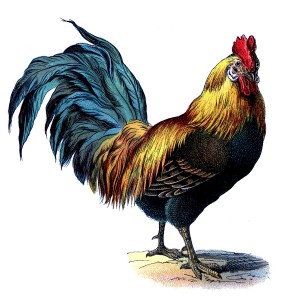Can you feel it? The cooling and contracting metal energy of fall is here, peaking in this Rooster month. It’s a welcome relief for my garden after a long and hot summer. The nights are getting cooler, days are noticeably shorter, it’s harvest time and the leaves are already falling from the trees.
 The month of the Yin Water Rooster (Gui You) began on September 8th and will end when the Yang Wood Dog (Jia Xu) month begins on October 8th. The month pillar consists of yin water in the stem and yin metal (xin) in the branch.
The month of the Yin Water Rooster (Gui You) began on September 8th and will end when the Yang Wood Dog (Jia Xu) month begins on October 8th. The month pillar consists of yin water in the stem and yin metal (xin) in the branch.
By the meteorological calendar fall has just begun. By the Chinese almanac we are a little more than halfway through the season of fall which is all about metal. It consists of August (Monkey), September (Rooster), and October (Dog). When it comes to the timing of gardening tasks I feel the Chinese almanac is more useful.
The energy of metal has to do with contraction and distillation. In the garden you can visualize how the metal element works by imagining how an apple tree harnesses the energy of the sun, water and nutrients of the soil, and condenses it to create fruit. After the apples are harvested the tree loses its leaves and goes dormant, seeming to shrink as if all the energy has been spent.
The arrival of the Rooster month signals the peak of metal energy and the perfect time for a fresh start. The looser pattern of summer living gives way to structure and organization of school. The contracting energy creates space for new beginnings. In the garden, the eternal return is evident as always. Deciduous plants and annuals are dying back while evergreens are setting bud for winter blooming.
The Rooster is pure yin metal. In using imagery to study four pillars the yin metal of the Rooster is likened to pruners, whereas the yang metal (geng) of the Monkey would be more like an axe. As we all know, there is literally a cutting quality to the energy of metal when it has been forged.
When the Rooster month comes I am reminded that it’s time to do some minor pruning. Snip snip. For major pruning (lop, saw and chop), it’s usually best to wait until the tree or shrub is dormant. In any case, pay attention to what the particular plant needs.
Other than that caveat, because the new growth is done, just a few little snips to remove small branches going in the wrong direction will effectively maintain the shape you intended.



